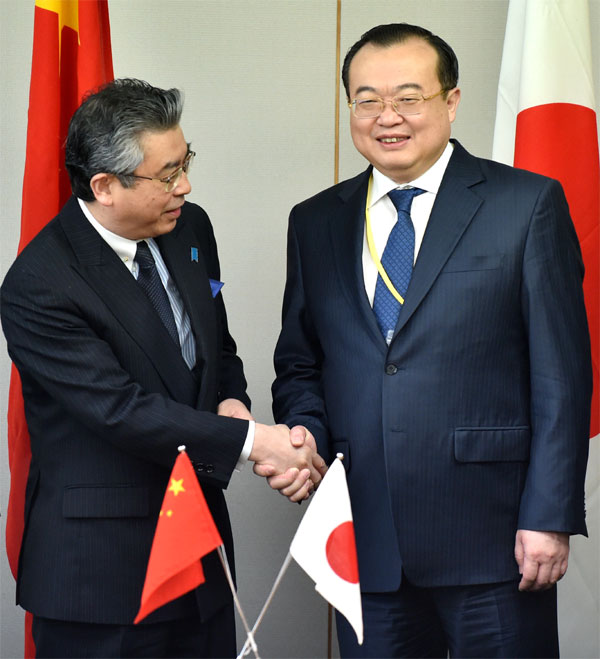Sino-Japanese dialogue resumes
Beijing raises concerns over a range of military, security policy issues with Tokyo
China and Japan resumed stalled security dialogue in Tokyo on Thursday after a suspension of more than four years.
During the 13th round of their security dialogue, Beijing "raised concerns" over a range of Japanese military and security policy issues in recent years, the Chinese Foreign Ministry said.
The security dialogue, launched in 1993, was last held in January 2011, in Beijing. Talks were suspended after bilateral ties were hit by territorial and historical issues in 2012.
The two nations have traded barbs over a range of security issues regarding the East China Sea.
With the in-depth discussions resuming, diplomatic and senior security officials from both countries agreed to "further fortify dialogue and communication on an equal footing" and to "press ahead with security cooperation in a steady and appropriate approach".
The strategic and mutually beneficial relationship between both countries should be boosted and developed, they said.
Assistant Foreign Minister Liu Jianchao, who co-chaired Thursday's discussions, said that the new dialogue is of significance to maintaining regional peace.
Japanese Deputy Foreign Minister Shinsuke Sugiyama said the two countries should talk directly to resolve problems in their ties.
Zhang Tuosheng, director of research and a senior fellow at the China Foundation for International Strategic Studies, said the resumed dialogue shows that China and Japan are "pressing ahead with capacity building for crisis management in real and concrete terms".
Thursday's meeting of high-ranking diplomats reflects a trend by both sides to upgrade the level of liaison since they achieved a breakthrough in November by reaching a four-point consensus for improving ties, Zhang said.
Although a media release did not elaborate on the specific concerns China raised on Thursday, Beijing said that Tokyo is expected to "shape an objective and reasoned understanding about China".
Japan was asked to adhere to its defensive policy "to further take the pathway of peace and development and play a constructive role in regional peace and stability".
Chinese officials and experts have paid great attention to Tokyo's plan to lift legislative bans on Japan's Self-Defense Forces as the 70th anniversary of the end of World War II nears.
Concerns have been voiced over Japan's plan to ease restrictions on the right to exercise collective self-defense, on exports of Japan's weapons as well as increased military deployment in Japan's remote southwestern islands.
This month, Cheng Yonghua, the Chinese ambassador to Japan, said in an interview with People's Daily that during the dialogue Beijing would ask Japan to "stop fabricating or exaggerating" China's so-called threat.
On Thursday, Beijing told Tokyo it "unswervingly seeks the pathway of peaceful development".
Chinese Foreign Ministry spokesman Hong Lei said in Beijing that the China-Japan security dialogue and regular diplomatic consultations held later in the same day are important channels of communication between the two countries' diplomatic and defense departments.
Zhang Jingquan, a professor of Northeast Asian studies at Jilin University, said China and Japan are now talking more about cooperation rather than divergence.
Contact the writers through zhangyunbi@chinadaily.com.cn
|
Assistant Foreign Minister Liu Jianchao (right) is welcomed by Japanese Deputy Foreign Minister Shinsuke Sugiyama in Tokyo on Thursday. Kazuhiro Nogi / AFP |



















